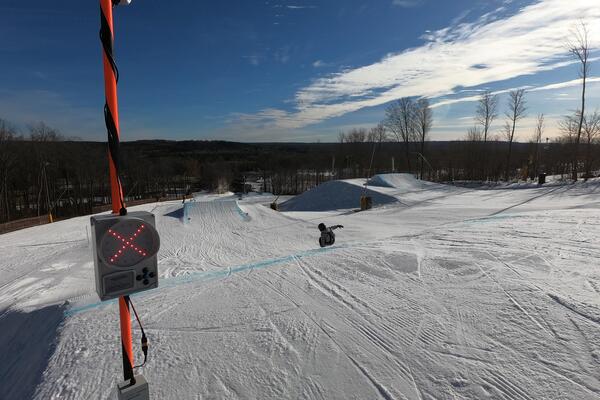
Entering the Dragons’ Den
Engineering student and entrepreneur Sam Dugan makes his best pitch on popular CBC show

Engineering student and entrepreneur Sam Dugan makes his best pitch on popular CBC show
By Brian Caldwell Faculty of EngineeringOne of the surest signs that Sam Dugan, 22, is a born entrepreneur might be this: he got the brainwave for his latest business venture, completely out of the blue, when he was on a date.
Two years later, while juggling studies as a third-year mechatronics engineering student at the University of Waterloo, he has turned that idea into a startup technology company to reduce injuries at ski resorts.
And on Thursday night, Dugan realized a childhood dream when he appeared in an episode of the CBC show Dragons’ Den to explain his product, SmartPatrol, and pitch the resident moguls for investments.
“I always secretly hoped I would be on the show one day, so it was surreal to be there in person,” he says of the taping in early September. “I mean, don’t we all, or was that just me?”

A green circle on the SmartPatrol display means it's safe to proceed.
Dugan - who brought along his younger brother Jeff, a second-year systems design engineering student at Waterloo, to give a demonstration in full ski gear - made good use of his time in the spotlight to negotiate a preliminary deal for a $250,000 investment by two of the dragons, Lane Merrifield and Michelle Romanow, in exchange for a 30-per-cent stake in his company.
It went so well that Dugan and mentor Dean Pacey, an angel investor and adjunct business lecturer at Waterloo, rented a local theatre to watch the episode with as many friends, relatives and supporters as COVID-19 restrictions would allow.
“This is a young man who has always been building and tinkering and creating stuff - and trying to make money,” Pacey says. “He is destined for success, whether it is with this business or not, because he is willing to listen and do the work to the nth degree.”
An avid skier who took half a year off between high school and university to work as an on-hill photographer in Whistler, Dugan developed SmartPatrol to monitor danger zones using a combination of computer vision and artificial intelligence.
A video camera mounted on a pole is aimed at areas, such as steep inclines and the landing zones of jumps, that approaching skiers and snowboarders can’t see.

Sam Dugan makes his pitch on Dragons' Den.
Computer vision software reads the video, recognizes fallen skiers or other dangers ahead, and sends signals to red and green symbols on the pole telling people to either stop or safely proceed.
The system also collects usage data to help resorts plan and has the potential to generate revenue in several ways. One possibility could be selling skiers video clips of themselves in action on the slopes. Customers could also include water parks, tube parks and other recreational facilities.
Vision Spatial Technologies, the company Dugan created with Pacey’s help to develop and market the technology, signed up its first paying customer, Barrie-area resort Mount St. Louis Moonstone, last ski season.
Two more Waterloo Engineering students, Connor Kent and Matt Nielsen, have joined the company, and it won recognition through the Velocity incubator program at Waterloo and as a national finalist for the James Dyson Award for student inventors.
The pandemic has slowed its growth, including possible expansion into western Canada and the United States, but Dugan still hopes to have up to five subscribers for its monitoring and data collection system this ski season.
“When I started this venture, I knew it wasn’t just going to be a year or two,” he says. “I’m only 22 and I’m in it for the long run. I’m here to make the world a safer place to play.”

A red X warns skiers and snowboarders of danger ahead.
Dugan has been a fan of Dragons’ Den since he was an 11-year-old cutting grass at up to 20 homes in his Waterloo neighbourhood. He started that business after realizing newspaper routes don’t pay very well.
After several years of mowing lawns, he sold his equipment and his clients to a younger boy across the street for $500. In late high school, he moved on to taking aerial real estate photographs with a drone.
Pacey, a former BlackBerry executive who worked for 30 years in the technology and telecommunications industries, first met Dugan when he knocked on his door and asked if he could cut his grass.
“He didn’t just show up with a lawnmower,” he recalls. “He had built a little trailer and an attachment for his bike to pull it around.”
Pacey signed up for the service and has never regretted it.
A decade or so on, he was his official on-call advisor when Dugan - a little nervous but thoroughly prepared after re-watching six seasons of old episodes - entered the Dragons’ Den at the CBC studios in downtown Toronto.

Read more
How Doug Kavanagh’s software engineering degree laid the foundation for a thriving career in patient care

Read more
Upside Robotics secures new funding to accelerate the future of sustainable farming

Read more
Redefining capstone learning by bringing students, faculty and community partners together to tackle real-world challenges
The University of Waterloo acknowledges that much of our work takes place on the traditional territory of the Neutral, Anishinaabeg, and Haudenosaunee peoples. Our main campus is situated on the Haldimand Tract, the land granted to the Six Nations that includes six miles on each side of the Grand River. Our active work toward reconciliation takes place across our campuses through research, learning, teaching, and community building, and is co-ordinated within the Office of Indigenous Relations.